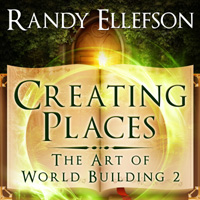

NY Times Bestselling author Piers Anthony was once again kind enough to read a volume in the series. This time, it was Creating Places, and he had this to say (bold highlights are mine):
“I read Creating Places—the Art of World Building Volume II, by Randy Ellefson. This is the second volume of a three volume work. The first volume was Creating Life, which I reviewed in Mayhem of this year. This volume addresses the settings a writer wishes to create, and it is exhaustive. So you invent a planet; does it have a moon? Because a moon facilitates the evolution of life on a planet, by stabilizing it; otherwise it could bobble all over, with disastrous consequences for life below.
“The book also gets into plate tectonics—drifting continents, for you ignorant folk—clarifying what is going on there. When one continental plate shoves under another, and melts, hot lava emerges from the surface above as volcanoes, some of which can be devastating. This too is important for the welfare of life. In fantasy you can do things magically, but in science fiction it is better to know what you’re talking about, and this reference spells it out. When the movements of the ground throw up mountain ranges, these can create rain shadows, with copious rain on the side where fronts come from, and deserts on the other side because the rain has been squeezed out. Bounteous California, but also Death Valley.
“What kind of creatures to you have? This touches on everything from dragons to elves. Are there guns or just swords? That too makes a difference when you’re up against hungry monsters. How do you travel? There are various ways on land. If there is plenty of water, then probably by ship; there is a competent discussion of the types of ship, including their sails. Next time I have a ship in my fiction, I expect to reread this portion, and get it right. Then there is the dubious art of politics. How are people governed? It goes into the various types of organization, from settlements to kingdoms, from autocracy on down. That discussion triggered an idea for me: suppose folk lived in a kakistocracy? That is, government by the worst. I may write a story about that. This book may well spawn similar ideas for you.
“It also has advice along the way on writing that I’m sure novice writers and perhaps some established ones too can profit from. I recommend this book as a basic reference; at worst it is a review of necessary concepts, and at best it will upgrade you from a mediocre speculative fiction writer to a superior one.“